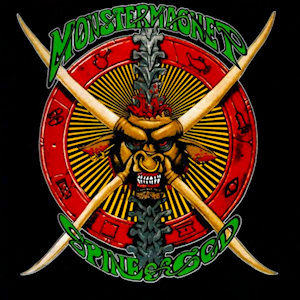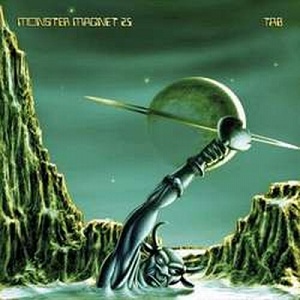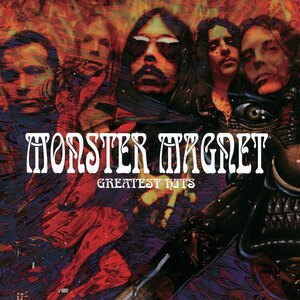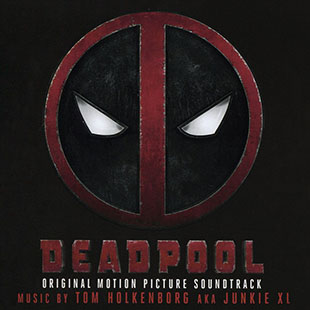
Monster Magnet is an American rock band, founded in Red Bank, New Jersey in 1989 by Dave Wyndorf, John McBain (guitar) and Tim Cronin. The band has since gone through several lineup changes, leaving Wyndorf as the only constant member. Monster Magnet has released ten studio albums to date, and they are best known for their 1990s hits "Negasonic Teenage Warhead" and "Space Lord". The band has also been credited for developing and popularizing the stoner rock genre, along with Masters of Reality, Kyuss, Fu Manchu and Sleep.

Powertrip is the fourth studio album by American rock band Monster Magnet, released on June 16, 1998. The album was the band's commercial breakthrough, achieving mainstream success due largely to the hit single "Space Lord". Other hit songs on the album include "Powertrip", "Temple of Your Dreams", and "See You in Hell". The album itself, reached #1 on the Heatseekers Charts, #21 in the German Charts, #65 in the UK Charts, and #97 on the Billboard 200. The album was certified gold by the RIAA on January 25, 1999.

Dopes to Infinity is the third album by American rock band Monster Magnet. It was released on March 21, 1995.

Spine of God is the debut studio album by American rock band Monster Magnet, released in Europe in 1991 and in the United States the following year. The album represents one of the earliest examples of the emerging 1990s sub-genre of stoner rock. Though Spine of God did not perform well commercially upon its initial release, the album was listed on Spin magazine's "Ten Best Albums of the Year You Didn't Hear" for 1991. The song "Medicine" was released as a single with accompanying music video.

Superjudge is the second full-length album released by American rock band Monster Magnet, released on April 6, 1993. It is the first Monster Magnet album to feature lead guitarist Ed Mundell, who replaced founding member John McBain in 1992. Tracks "Twin Earth" and "Face Down" were released as singles with accompanying music videos.

Tab is the second EP by American rock band Monster Magnet, released in 1991. Initially released only in Europe, it was recorded before the band's 1991 debut full-length album Spine of God and was not released in North America until after the group's 1993 album Superjudge became a minor hit. The EP is generally viewed as Monster Magnet's most psychedelic release, with the first two tracks alone totaling 45 minutes.

God Says No is the fifth studio album by American rock band Monster Magnet. It was released in the United Kingdom on November 12, 2000, and in the United States on April 10, 2001. It was a commercial failure compared to their previous album, Powertrip. It was their last release recorded for A&M Records, due to problems with promotion of the album but it reached #17 in Germany. It would also be the last release with bassist Joe Calandra and drummer Jon Kleiman.

Negasonic Teenage Warhead is a superheroine appearing in American comic books published by Marvel Comics. Created by Grant Morrison and Frank Quitely, the character first appeared in New X-Men #115 (2001). She is named after the song "Negasonic Teenage Warhead" by Monster Magnet. She belongs to a subspecies of humans called mutants, who are born with superhuman abilities. Negasonic Teenage Warhead's appearance and powers were eventually altered in the comics to match her appearance in the Deadpool films, in which she is portrayed by Brianna Hildebrand.

Monolithic Baby! is the sixth studio album by American rock band Monster Magnet, released in 2004. It is a follow-up to 2000's God Says No. It would also be the first album featuring bassist Jim Baglino. Bob Pantella was hired to fill the band's drum position after the album's recording; the drums on the album were performed by Michael Wildwood.

Greatest Hits is a compilation album by American rock band Monster Magnet, released in 2003 via A&M Records. The first disc contains the band's best-known material, and contains tracks from 1991's Spine of God up until their 2000 effort, God Says No, while the second disc contains the band's music videos and a few B-sides and rarities.
Daniel Rey is an American musician, record producer and songwriter from New York City, best known for his work with the punk rock band Ramones.

4-Way Diablo is the seventh studio album by American rock band Monster Magnet. It was recorded in four different studios: Sound City Studios, American Studios, The Sunset Lodge and Hydeaway Studios. It was released in 2007, November 5 in Europe and November 6 in the United States where it sold 1,800 copies on its first week of release. This album doesn't feature guitarist Phil Caivano.

"Space Lord" is a 1998 single by American rock band Monster Magnet from the album Powertrip. The song is in the key of C minor. It brought them mainstream success, with its accompanying music video directed by Joseph Kahn. The song peaked at number three on the Billboard Mainstream Rock Songs chart, and number twenty-nine on the Billboard Alternative Songs chart. A remixed version of the song was also made, and was featured on their compilation album Greatest Hits. The music video is notable for being the first video ever aired on MTV's Total Request Live on September 14, 1998. It appeared on the countdown five times climbing no higher than the No. 7 position.
Stoner rock, also known as stoner metal or stoner doom, is a rock music fusion genre that combines elements of doom metal with psychedelic rock and acid rock. The genre emerged during the early 1990s and was pioneered foremost by Kyuss and Sleep.

Mastermind is the eighth studio album by American rock band Monster Magnet. A video for the first single, "Gods and Punks", was released on October 1, 2010. The album was released on October 25, 2010. It debuted at No. 165 on the Billboard 200 selling around 3,000 copies, becoming the band's first album since 2001's God Says No to chart on the Billboard 200. Mastermind was the final album of lead guitarist and long-term member Ed Mundell, as well as bassist Jim Baglino. This album marked the return of guitarist Phil Caivano after his 4-year hiatus.

"I Hate Myself and Want to Die" is a song by the American rock band Nirvana, written by vocalist and guitarist Kurt Cobain. It was first released in November 1993 as the first track on The Beavis and Butt-Head Experience compilation album which peaked at number 5 on the Billboard 200.

Milking the Stars: A Re-Imagining of Last Patrol is the remix studio album by the American rock band Monster Magnet. According to the band's frontman Dave Wyndorf, the album is a "reimagined" version of their previous album, 2013's Last Patrol, featuring four new songs and two live tracks. The album is not strictly a remix of Last Patrol; songs feature new recordings and arrangements aimed at giving the album what Wyndorf describes as "a weird 1960s vibe". The album closes with two live tracks which were recorded at the AB in Brussels in 2014, and which feature the debut performance of the band's new bassist, Chris Kosnik.

Brianna Caitlin Hildebrand is an American actress. She is best known for appearing as Negasonic Teenage Warhead in the films Deadpool (2016), Deadpool 2 (2018), and Deadpool & Wolverine (2024). She is also known for appearing in the web series Annie Undocumented, and as the character Aurora in the Netflix show Lucifer. She also portrayed Elodie Davis in the show Trinkets.

Cobras and Fire is the redux studio album by the American rock band Monster Magnet. The album is a reworking of material previously included on Mastermind (2010).

The soundtrack for the 2016 American superhero film Deadpool, based on the Marvel Comics character of the same name and distributed by 20th Century Fox, consists of an original score composed by Tom Holkenborg and a series of songs featured in the film. An album featuring these, named Deadpool: Original Motion Picture Soundtrack, was released on February 12, 2016. It reached number 30 on the US Billboard 200, and topped the soundtrack list from Billboard.


















